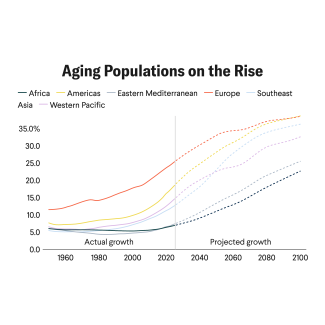The widespread Kurdish proverb "there are no friends but the mountains" was proved true on December 23, 2023, when the Turkish Air Force bombed large parts of the Autonomous Administration of North and East Syria—known as Rojava in Kurdish. Attacks against the Kurds are common given that Turkish President Recep Tayip Erdogan considers the people there to be "terrorists" and therefore "legitimate" targets.
This time, unlike in previous years, the bombardments targeted mainly civil infrastructure, including oil production facilities, granaries, and medical facilities such as hospitals.
Those attacks are exacerbating the humanitarian crisis and could have drastic consequences for human security and population health.
Rojava is a self-declared autonomous region in northern and eastern Syria. It was established by Arabs, Kurds, and other ethnic groups in 2013 during the Syrian Civil War, after the Syrian government's weakened control in certain areas created a power vacuum. Rojava is known for its emphasis on decentralization, grassroots democracy, and inclusive governance. It has implemented a political system that seeks to include representatives from various ethnic and religious groups, with a focus on gender equality. The territory's army, the Syrian Democratic Forces, has also played a significant role in the fight against the self-declared Islamic State in the region, receiving support from the international coalition.
However, the Islamic State was not the only concern of the people there, who had to endure severe battles against the terrorist group: even during an attempted coup in 2016, the Turkish army attacked large parts of the Kurdish-Arab region with Islamist rebel groups and captured some areas such as Efrin, in northern Syria. Since then, human rights and environmental organizations have complained about enormous violations of international conventions. One well-known victim of Turkish attacks was Hevrîn Xelef, a Syrian Kurd politician who was brutally murdered at the end of 2019.
By 2023, the offensives had reached a new level when a power grid collapsed, cutting off electricity to large parts of Rojava. That coincided with the worsening medical shortage and local sources reported deaths due to inadequate medical treatment facilities. According to representatives of health authorities, 70 patients in need of intensive dialysis treatment were unable to receive care after the clinic was damaged, resulting in at least one death and leaving patients in critical condition.
In addition to the dialysis center, which was one of two in Jazira Canton, an oxygen center was heavily bombarded and destroyed. Structures, including a mobile clinic, that were not attacked had to temporarily suspend operations to avoid becoming a target of Turkish drones. German-Kurdish projects in particular have been targeted recently. The Kobanî Medical Center, which was founded by Doctors Without Borders and financed by German charity organizations, provided medical services for diabetics and children. Now, it's no longer operational.
In light of Turkish airstrikes, both Arabs and Kurds in the region feel abandoned by the United States and its Western allies. Although multilateral bodies, including NATO, which both the United States and Turkey are a part of, should deter Ankara from attacking from any attacks on Washington's allies, Turkey is not complying, and criticism from the United States is vague. Each attack on Rojava further destabilizes a region battered by civil war. Turkish airstrikes, dagger attacks by Iranian proxies, and the ongoing humanitarian crisis are challenges the region should not have to tackle on its own.
Considering that thousands of Islamic State fighters are in Kurdish captivity and that any escalation by Turkey would cause setbacks to the fight against the Islamic State, the United States should consider an intervention that ensures the safety of Kurds living in Rojava, and by extension, help the fight against terrorism.
To improve health in Rojava, the United States should increase humanitarian aid, providing medical supplies and training health-care professionals
An important first step could be an export ban for the F-16 warplanes to Turkey because they could be used against Kurdish forces. The commander-in-chief of the Syrian Democratic Forces once more stated his concerns over export of arms to Turkish military forces and warned about the consequences. In addition, further financial and logistic support is necessary to sustain the developments made in the region. This would not only benefit the joint fight against the Islamic State but also strengthen Kurdish-U.S. relations and lead to a safer Middle East and North Africa policy.
To improve health in Rojava, the United States should increase humanitarian aid, providing medical supplies and training health-care professionals. That approach could ensure the long-term availability of medical care. Psychological help should not be neglected either: trauma is ubiquitous in war zones and the deployment of psychological specialists from allies is essential.
In the meantime, however, Kurdish people in Rojava are proving their resilience by building infrastructure, renovating plazas, and setting up temporary accommodations. Even though Turkish attacks are imminent, the Kurdish people will continue to fight.


